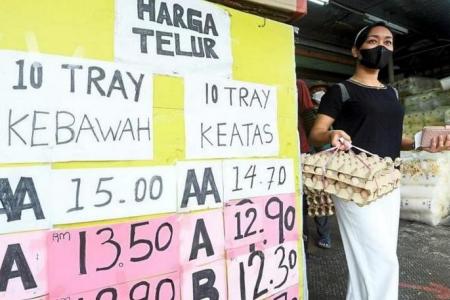Eggs in Malaysia may cost more as poultry farms face losses, close or cut output
KUALA LUMPUR (THE STAR/ASIA NEWS NETWORK) - The cheapest source of protein may cost more as a shortage is looming after poultry farms in Malaysia slash production due to increasing costs, limited subsidies and a ceiling price to adhere to.
The closure of about 40 per cent of poultry farms - which have fallen from over 300 to just 170 - is not helping.
Those still operating say they need better subsidies to keep prices low, especially with the doubling of chicken feed prices. Many of them say they are also on the brink of folding.
The farmers say they lose 5 sen per egg despite the government subsidy of 5 sen each.
Federation of Livestock Farmers Associations of Malaysia deputy president Lee Yoon Yeau said the war in Ukraine had pushed maize and soybean meal prices up by another 50 per cent between April and June.
"Maize and soybean meal make up over 80 per cent of chicken feed. Since the pandemic two years ago, farmers have been struggling due to the increasing feed cost," he said on Friday (July 15).
"Maize used to cost RM800 (S$252) per tonne before the pandemic. During Covid-19, it went up to RM1,300 per tonne. Now, it's more than RM1,800 per tonne."
Soybean meal, he added, now costs over RM2,650 per tonne, up from RM1,650 in January 2020.
Mr Lee said that although the government had set the ceiling price at RM0.35 per egg (Grade C) from Feb 5 to June 30, the cost of production had risen to RM0.45 per egg.
"So, with a 5 sen per egg subsidy, we lose 5 sen. With the current daily production of 28 million tonnes, the loss is RM1.04 million daily and RM42 million monthly for farmers," he said.
For July and August, the government has announced an increase of 2 sen in ceiling price per egg, with nothing said about the subsidy.
Mr Lee, the federation's poultry layer unit chairman, said the federation wanted a subsidy of 8 sen per egg to be able to sell at cost price.
"We are not talking about profits, but only to break even so we can pay our suppliers and workers," he said.
Mr Lee said that many small farmers had shut down for good, while the bigger farms had scaled down production, mainly because they could not operate at a loss.
"Also, the increase in the minimum wage from RM1,200 to RM1,500 in May, and other cost increases, have made things worse for farmers," he said.
He warned that a shortage of eggs would occur if farmers were forced to continue selling at a loss.
"If the government is not keen to provide a reasonable subsidy, it should allow prices to be floated and let market forces decide," he said.
"The farmers are now holding on to their last breath in the intensive care unit. The poultry industry could collapse soon."
Floating the prices was not new in Malaysia and in the past, egg prices were controlled only during festive seasons, he said.
Malaysian Bakery, Biscuit, Confectionery, Mee and Kuay Teow Merchants Association president Lai Yee Kein said that in the case of a price change in eggs, businesses that use them, such as bakeries and eateries, would be affected the most.
"The situation will depend on the usage volume and consumption," he said on Friday.
"Although one can always eat fewer eggs, it will eventually trickle down to the normal consumers like you and me."
According to Mr Lai, a ceiling price system to control the prices of eggs will result in lower supply and a shortage.
"It is illogical not to let farmers adjust prices while the cost of raw materials has skyrocketed," he said.
"The government should make the right decision because this concerns the country's economy."
He added that a prolonged shortage could make things worse for farmers and consumers.
He said consumers should also understand the reasoning behind the price increase and not blame it on the farmers or businesses.
"Malaysia produces more than enough chicken and eggs for its citizens' consumption, and we even export them. However, the pandemic and the ongoing Russia-Ukraine conflict have brought about many problems, causing the price of chicken feed to go up. This is not something we can control," he said, adding that the onus was on the government to keep the impact minimal.
Mr Lai said the government should do more to assist farmers in times of need, especially when the country's food security demands more attention.
"It is always better to be strong on our own without relying on outsiders. Our poultry industry should be prioritised and protected," he added.
Get The New Paper on your phone with the free TNP app. Download from the Apple App Store or Google Play Store now


